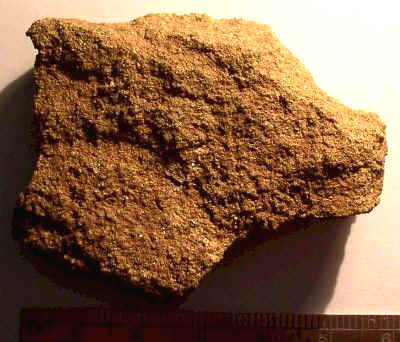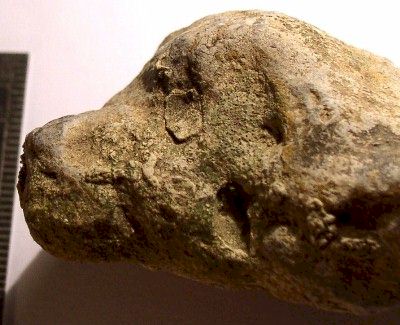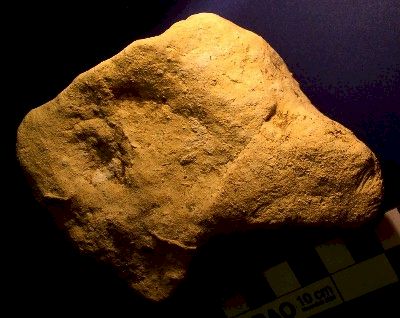Page 16 of 16
Posted: Thu Jan 04, 2007 3:50 pm
by Charlie Hatchett

For example, sell this one as a hand chopper (it's definitely knapped), and don't even bring up the image. Let people see it for themselves.
Beautiful!
Posted: Thu Jan 04, 2007 4:14 pm
by Digit
I've followed this thread since its inception because I know nothing about the subject and joined the forum to learn anyway.
Quite why the idea of art that early should appear to be a touchy subject I don't understand. Any animal with an opposable thumb can bang to stones together, but to knap flint implies that the napper has a finished product in mind.
I can see Zorb sitting there roughing out a nodule and suddenly realising 'that looks like old Zeg,' and knapping a bit more to improve the likeness before finishing it as a hand axe or whatever.
In fact I would ask by what other route, I wonder, would art have arisen?
Posted: Thu Jan 04, 2007 4:40 pm
by Manystones
Digit wrote:Quite why the idea of art that early should appear to be a touchy subject I don't understand
Because it goes against the prevailing model that Homo Sapiens Sapiens moving out of Africa into Europe were unique in showing "intelligence" manifest in cave art from no earlier than 50,000 bp.
If Erectus, Heidlebergensis, or Neandertals created art in 2d and 3d on stone and flint way before this it kinda goes a long way to debunking this myth.
Digit wrote:In fact I would ask by what other route, I wonder, would art have arisen?
Common sense would say that it had to be evolutionary rather than "overnight".
Posted: Thu Jan 04, 2007 4:50 pm
by Digit
Granted it probably wouldn't have been over night Richard, I also think it rather unlikely that art started with the cave art. Who ever drew some of the horses that I've seen on cave walls had fully mastered their technique, they had also mastered perspective, and ability that seems to have subsequently lost in Europe in later times.
I can not see that the cave art is anything other than the result of a long tradition of art on other media.
Posted: Fri Jan 05, 2007 1:00 am
by Beagle
Manystones wrote:Digit wrote:Quite why the idea of art that early should appear to be a touchy subject I don't understand
Because it goes against the prevailing model that Homo Sapiens Sapiens moving out of Africa into Europe were unique in showing "intelligence" manifest in cave art from no earlier than 50,000 bp.
If Erectus, Heidlebergensis, or Neandertals created art in 2d and 3d on stone and flint way before this it kinda goes a long way to debunking this myth.
Digit wrote:In fact I would ask by what other route, I wonder, would art have arisen?
Common sense would say that it had to be evolutionary rather than "overnight".
I agree with that Richard.
Also, I have looked at those posts that you've sent me, and it looks to me like you are dealing with a government bureaucracy that is too intractable
to waste your time with. As Min would say, you're up against the Club.
You might try getting the opinions of others here who could tell you another direction to take, especially our "rock stars" like Charlie or Cognito.
That must have been very frustrating.
Posted: Fri Jan 05, 2007 2:10 am
by Digit
And if Richard is honoured in the future for his work he will also have the same Government 'jobsworths' on his neck for disturbing ancient monuments!
Posted: Sat Jan 20, 2007 10:28 pm
by AD
Greetings...
I thought I'd throw in something here for those trying to photograph the often subtle imagery in these old stones. Visitors to my website from the USA and Europe are constantly e-mailing me photos (and these are most welcome) of what they have found. In many cases I can see what they are trying to show, but they have just pointed the camera at the object and shot, and this usually falls far short of doing the job effectively. Following is an excerpt from an e-mail I recently sent to such a collector explaining what I have found to be the best approach:
----------
First, using a flash almost never works - this washes out the details.
Since the images were carved with the light source above (sun), they are best photographed under light from above the top of the image, shining across its surface at a grazing angle. A lamp usually works fine, daylight is better in some cases. With smaller stones, I usually lay these on a table with the image surface facing upward, and situate a small flexible-neck table lamp bent down and turned to shine toward me across the image at the optimal horizontal angle. One must experiment with the light's placement to show an image to its best advantage. This takes some patience. Those folks were not creating obvious "art" as such - just routinely incorporating simple images as they thought was required. (But sometimes the detail and workmanship are quite amazing.)
----------
And now I have added a page to the website showing an example of this with a difficult subject:
http://www.daysknob.com/Lighting_Demo.htm
I hope you might find this helpful.
Regards, Alan
http://www.daysknob.com
Posted: Sat Jan 20, 2007 11:26 pm
by Beagle
Very nice website there AD.
Posted: Tue Jan 23, 2007 12:52 pm
by Manystones
I wonder whether our latest member will be kind enough to cast a critical eye upon both Charlie's and my assemblages.
Welcome Knapp Happy!
Posted: Tue Jan 23, 2007 12:58 pm
by Manystones

Alan that particular piece reminds me of a comment I read on a website recently about lion images often being mistaken for dogs or similar animals. Could it be feline?
(
http://www.angelfire.com/trek/archaeology/cats.html -
Beware the music!)
Posted: Tue Jan 23, 2007 6:09 pm
by AD
Could it be feline?
Greetings, Richard...
That's a possibility, I guess, but judging from the overall profile and the mouth, canine seems more likely to me. And this guy fits in with these two distinctly canine figures from the same site:


Of course with a sufficient infusion of fermented barley juice I might see the Harlot of Babylon, but right now I'm voting for wolf.
Alan
http://www.daysknob.com




